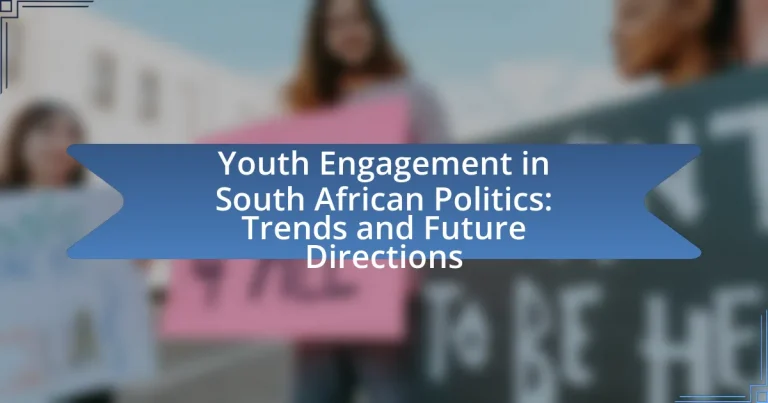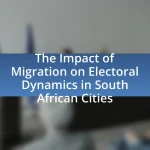Youth engagement in South African politics encompasses the active participation of young individuals in political processes, decision-making, and civic activities, which is vital given that approximately 35% of the population is aged between 15 and 34. This article explores the significance of youth involvement in shaping policies that impact their lives, the historical context influencing their political participation, and the current trends driven by social media and activism. It also addresses the challenges young people face, such as political apathy and socioeconomic barriers, while highlighting the role of educational initiatives and mentorship in fostering political awareness. Furthermore, the article discusses practical steps for youth engagement and the potential future directions for enhancing their participation in South African politics.
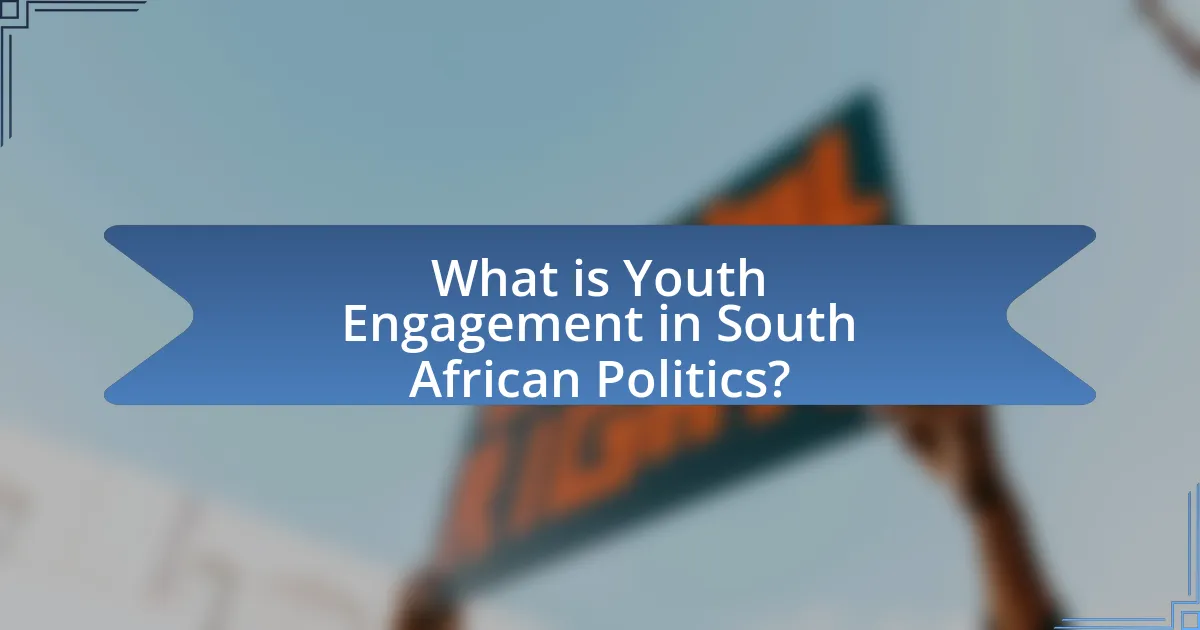
What is Youth Engagement in South African Politics?
Youth engagement in South African politics refers to the active participation of young people in political processes, decision-making, and civic activities. This engagement is crucial as South Africa has a significant youth population, with approximately 35% of its citizens aged between 15 and 34, according to Statistics South Africa. Young people in South Africa engage through various means, including voting, activism, and involvement in political parties and organizations, which are essential for shaping policies that affect their lives and communities. The importance of youth engagement is underscored by the historical context of the anti-apartheid struggle, where youth played a pivotal role, highlighting the ongoing relevance of their participation in contemporary politics.
Why is youth engagement important in the political landscape of South Africa?
Youth engagement is crucial in the political landscape of South Africa because it fosters democratic participation and addresses issues that directly affect young people. Engaging the youth allows for the incorporation of their perspectives on critical matters such as education, employment, and social justice, which are vital for national development. According to the 2021 South African Youth Survey, 63% of young South Africans expressed a desire to participate in politics, highlighting their potential influence on policy-making. Furthermore, youth involvement can lead to increased voter turnout and a more representative government, as evidenced by the significant role young voters played in the 2019 national elections, where they constituted about 50% of the electorate. This engagement not only empowers the youth but also strengthens the democratic fabric of the nation.
What historical factors have influenced youth political participation in South Africa?
Historical factors that have influenced youth political participation in South Africa include the legacy of apartheid, the role of the youth in the anti-apartheid struggle, and the impact of democratic transition. The apartheid regime, which enforced racial segregation and oppression, galvanized youth activism, exemplified by the Soweto Uprising in 1976, where students protested against the imposition of Afrikaans in schools. This event marked a significant turning point, leading to increased political consciousness among young people. Following the end of apartheid in 1994, the establishment of a democratic government created new avenues for political engagement, yet challenges such as socio-economic disparities and disillusionment with political parties have continued to shape youth participation. The historical context of resistance and the ongoing struggle for equality and representation remain central to understanding the dynamics of youth political involvement in South Africa.
How does youth engagement impact democratic processes in the country?
Youth engagement significantly enhances democratic processes in South Africa by increasing political participation and fostering accountability. When young people actively participate in elections, advocacy, and civic activities, they contribute to a more representative political landscape. For instance, the 2019 national elections saw a notable increase in voter turnout among youth, with 50% of eligible voters aged 18-29 casting their ballots, compared to 46% in 2014. This engagement not only amplifies youth voices but also pressures political leaders to address issues pertinent to younger demographics, such as education and employment. Furthermore, organizations like the South African Youth Council advocate for youth interests, ensuring that their perspectives are integrated into policy-making processes, thereby strengthening the overall democratic framework.
What are the current trends in youth engagement in South African politics?
Current trends in youth engagement in South African politics include increased activism through social media, participation in protests, and involvement in political organizations. Young South Africans are leveraging platforms like Twitter and Instagram to mobilize support for issues such as climate change, education reform, and social justice. According to a 2021 study by the Institute for Justice and Reconciliation, 70% of South Africans aged 18-24 reported that they feel empowered to influence political decisions through online activism. Additionally, youth-led movements, such as the #FeesMustFall campaign, have demonstrated a significant impact on national policy discussions, highlighting the growing role of young people in shaping the political landscape.
What role do social media and technology play in youth political activism?
Social media and technology serve as crucial platforms for youth political activism by facilitating communication, mobilization, and awareness. These tools enable young activists to share information rapidly, organize events, and engage in discussions on political issues, significantly amplifying their voices. For instance, the #FeesMustFall movement in South Africa utilized social media to mobilize thousands of students against rising tuition fees, demonstrating the effectiveness of these platforms in driving collective action. Additionally, research from the Pew Research Center indicates that 72% of young adults use social media to engage with political content, highlighting its role in shaping political opinions and fostering activism among youth.
How are youth-led organizations shaping political discourse in South Africa?
Youth-led organizations are significantly shaping political discourse in South Africa by mobilizing young people around critical social issues and advocating for policy changes. These organizations, such as the South African Youth Council and #FeesMustFall movement, have effectively utilized social media platforms to amplify their voices and engage a broader audience. For instance, the #FeesMustFall protests in 2015 highlighted the issue of higher education funding, leading to national conversations about accessibility and affordability in education. This grassroots activism has pressured political leaders to address youth concerns, resulting in policy discussions that prioritize youth representation and participation in governance.
What challenges do young people face in engaging with politics in South Africa?
Young people in South Africa face several challenges in engaging with politics, including political apathy, lack of access to information, and socioeconomic barriers. Political apathy is prevalent among the youth, with studies indicating that many feel disillusioned by the political system and believe their participation will not lead to meaningful change. Additionally, limited access to reliable information about political processes and candidates hampers informed decision-making. Socioeconomic barriers, such as high unemployment rates and poverty, further restrict young people’s ability to participate actively in political activities, as they often prioritize immediate economic survival over political engagement. These factors collectively contribute to a significant disengagement of youth from the political landscape in South Africa.
What barriers exist that hinder youth participation in political processes?
Barriers that hinder youth participation in political processes include lack of access to information, socioeconomic challenges, and political apathy. Research indicates that many young people in South Africa face difficulties in obtaining relevant political information due to inadequate educational resources and limited media coverage tailored to their interests. Additionally, socioeconomic factors such as unemployment and poverty can discourage youth from engaging in political activities, as they prioritize immediate survival over civic involvement. Furthermore, a sense of disillusionment with political systems, often stemming from perceived corruption and inefficacy, contributes to political apathy among the youth, leading to lower participation rates in elections and civic initiatives.
How do socioeconomic factors affect youth engagement in politics?
Socioeconomic factors significantly influence youth engagement in politics by shaping access to education, resources, and opportunities for participation. For instance, youth from lower socioeconomic backgrounds often face barriers such as limited access to quality education and civic resources, which can hinder their political awareness and involvement. Research indicates that in South Africa, youth from wealthier families are more likely to participate in political activities, as they have greater access to information and networks that facilitate engagement. A study by the Institute for Justice and Reconciliation found that socioeconomic disparities contribute to varying levels of political participation among young people, with those in disadvantaged communities exhibiting lower levels of engagement due to economic constraints and lack of political representation.
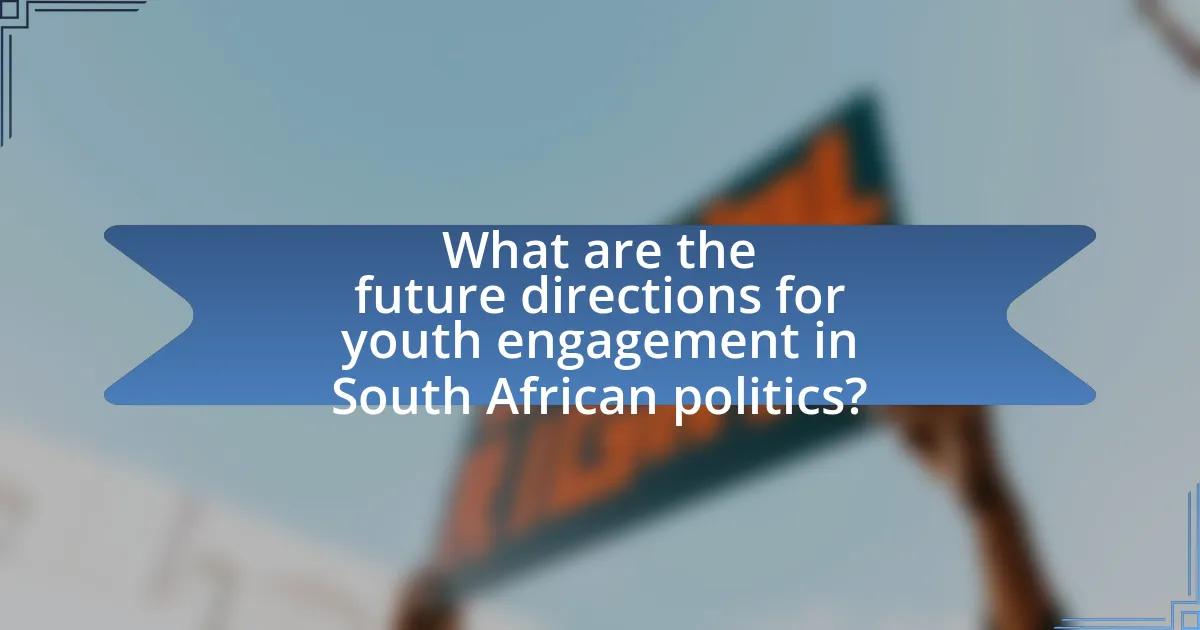
What are the future directions for youth engagement in South African politics?
Future directions for youth engagement in South African politics include increased digital activism, enhanced participation in political processes, and the establishment of youth-led organizations. Digital platforms are becoming vital for mobilizing young voters, as evidenced by the rise of social media campaigns that have successfully influenced political discourse. Furthermore, initiatives like the Youth Development Strategy aim to integrate youth perspectives into policy-making, reflecting a growing recognition of their role in shaping governance. The South African government has also committed to creating more opportunities for youth involvement in decision-making processes, which is crucial for fostering a politically active generation.
How can educational initiatives enhance youth political participation?
Educational initiatives can enhance youth political participation by providing knowledge about political processes, fostering critical thinking, and encouraging civic engagement. For instance, programs that educate young people about their rights and responsibilities as citizens can lead to increased voter turnout; research indicates that informed youth are 50% more likely to vote compared to their uninformed peers. Additionally, initiatives that promote discussions on current events and political issues can empower youth to express their opinions and engage in activism, as evidenced by the rise of youth-led movements in South Africa, such as #FeesMustFall, which mobilized thousands of students around educational reform.
What role do schools and universities play in fostering political awareness among youth?
Schools and universities play a crucial role in fostering political awareness among youth by providing educational frameworks that encourage critical thinking and civic engagement. These institutions often incorporate curricula that cover political history, governance, and social issues, which helps students understand their rights and responsibilities as citizens. For instance, research conducted by the South African Institute of Race Relations indicates that educational programs focused on democracy and human rights significantly enhance students’ understanding of political processes. Additionally, universities often host debates, workshops, and student organizations that promote active participation in political discourse, further cultivating a politically aware youth.
How can mentorship programs support young political leaders?
Mentorship programs can support young political leaders by providing them with guidance, networking opportunities, and practical skills essential for effective leadership. These programs connect emerging leaders with experienced mentors who can share insights on political processes, strategy, and decision-making. Research indicates that mentorship enhances leadership capabilities; for instance, a study by the Harvard Business Review found that mentees are more likely to advance in their careers and develop critical skills when paired with seasoned professionals. Additionally, mentorship fosters confidence and resilience, which are vital for navigating the complexities of political environments.
What strategies can be implemented to increase youth voter turnout?
To increase youth voter turnout, implementing targeted outreach programs that utilize social media platforms is essential. Research indicates that 90% of young people in South Africa are active on social media, making it a powerful tool for engagement. Campaigns that focus on educating youth about the voting process, including registration and the importance of their vote, can significantly enhance participation. Additionally, organizing community events that combine entertainment with civic education can attract young voters. For instance, initiatives like “Rock the Vote” have successfully increased turnout by creating a fun and informative atmosphere.
What innovative campaigns have successfully mobilized young voters in the past?
Innovative campaigns that have successfully mobilized young voters in the past include the “Vote for Your Future” campaign in South Africa, which utilized social media platforms to engage and inform young voters about the electoral process and issues affecting their lives. This campaign saw a significant increase in voter turnout among the youth demographic, with statistics showing a rise from 25% to 40% in participation during the 2019 elections compared to previous years. Additionally, the “#YouthVote” initiative leveraged influencers and peer-to-peer messaging to create a sense of urgency and importance around voting, resulting in heightened awareness and engagement among young South Africans.
How can collaboration between political parties and youth organizations improve engagement?
Collaboration between political parties and youth organizations can significantly improve engagement by creating platforms for dialogue and participation that resonate with young people’s interests. This partnership allows political parties to tap into the innovative ideas and energy of youth organizations, fostering a sense of ownership among young people regarding political processes. For instance, initiatives like the South African Youth Development Strategy emphasize the importance of youth involvement in governance, highlighting that inclusive decision-making leads to policies that better reflect the needs of younger demographics. By working together, political parties can also leverage the outreach capabilities of youth organizations to mobilize and educate young voters, ultimately increasing voter turnout and civic participation.
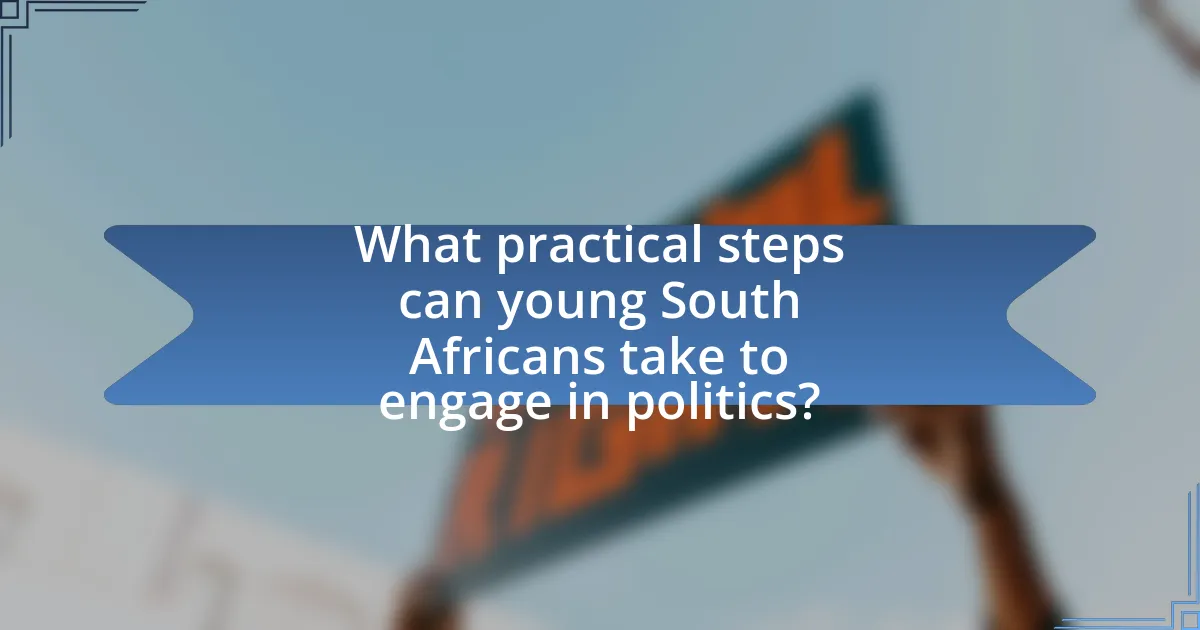
What practical steps can young South Africans take to engage in politics?
Young South Africans can engage in politics by participating in local governance, joining political parties, and advocating for issues that matter to them. Engaging in local governance allows youth to influence decisions that affect their communities directly, while joining political parties provides a platform for collective action and representation. Advocacy can take the form of campaigns, social media activism, or community organizing, which raises awareness and mobilizes support for specific causes. According to the 2021 South African Youth Survey, 70% of young people expressed interest in political issues, indicating a strong potential for active participation.
How can young people effectively advocate for their political interests?
Young people can effectively advocate for their political interests by organizing grassroots movements and utilizing social media platforms to amplify their voices. Grassroots movements enable youth to mobilize support around specific issues, fostering community engagement and collective action. For instance, the #FeesMustFall movement in South Africa demonstrated how student-led protests can influence national policy on education funding. Additionally, social media serves as a powerful tool for outreach and awareness, allowing young advocates to connect with a broader audience and engage in discussions that shape public opinion. Research indicates that 70% of young South Africans use social media to express their political views, highlighting its significance in modern advocacy efforts.
What resources are available for youth to learn about political processes?
Youth can learn about political processes through various resources, including educational programs, online platforms, and community organizations. Educational programs such as the South African Youth Leadership Program provide workshops and seminars focused on civic education and political engagement. Online platforms like the Youth Portal of South Africa offer accessible information on government structures, electoral processes, and civic rights. Additionally, organizations such as the Electoral Commission of South Africa conduct outreach initiatives aimed at educating young people about their voting rights and responsibilities. These resources collectively empower youth to understand and participate in the political landscape effectively.
How can young South Africans build networks to amplify their voices in politics?
Young South Africans can build networks to amplify their voices in politics by actively participating in community organizations, engaging in social media campaigns, and collaborating with youth-led initiatives. Community organizations provide platforms for young individuals to connect with like-minded peers and influential leaders, fostering discussions on political issues. Social media serves as a powerful tool for outreach, allowing youth to share their perspectives, mobilize support, and engage with broader audiences. Collaborating with youth-led initiatives, such as the South African Youth Council, enables young South Africans to unify their efforts, advocate for policy changes, and increase their visibility in political discourse. These strategies are supported by the increasing trend of youth activism in South Africa, where young people have successfully influenced policy decisions and raised awareness on critical issues such as education and unemployment.
